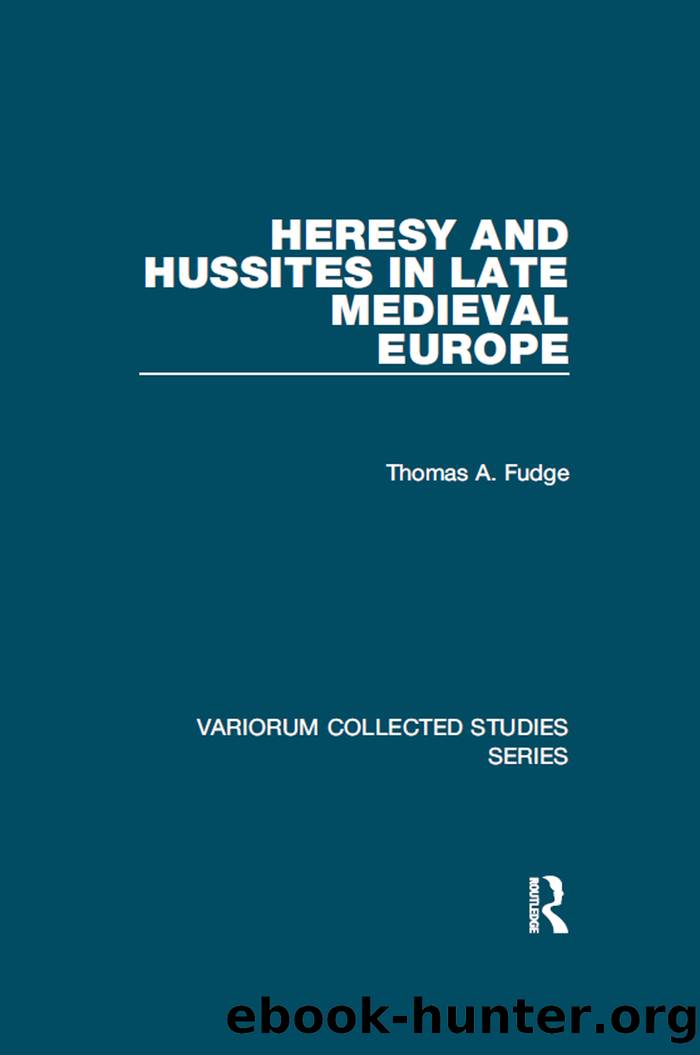Heresy and Hussites in Late Medieval Europe by Thomas A. Fudge;

Author:Thomas A. Fudge;
Language: eng
Format: epub
Publisher: Taylor & Francis (Unlimited)
Published: 2014-08-15T00:00:00+00:00
This is an altogether reasonable reply and functions as a literary device aimed at providing a counterbalance to the emotional outbursts of Tábor. Václav admits in principle â somewhat grudgingly â that some of the Hussite ideas are good, namely the reform of abuses, but he takes strong exception to the flawed methodology employed to correct those abuses. This leads the reformers perhaps unwittingly to âcommit many heresiesâ. It would be quite wrong to assume that Václav had much sympathy for the followers of Jan Hus and this may be judged in part from his dismissive statement on the central plank of Hussite doctrine: âthere is no need for those Four Articles of Pragueâ.27 The battle lines are clearly drawn.
Tábor curiously is presented as defending the âvoice of the new faithâ.28 This suggests a deliberateness on the part of the author to associate the Hussite movement with heresy. Hussites believed their doctrine and religious practices were not new but rather rediscovered old practices and ideas of the apostolic age. Once Tábor sets forth an argument for utraquist practice he appears to have won an adherent to the faith. âHavel âthe Wavererâ gives thanks and starts to kneel.â29 But this conversion is averted at the last moment by the intervention of Václav.30 Denouncing all Hussite parties as âmuddle-headsâ and âdisciples of Satanâ, Václav frames a clear injunction that all must submit to holy mother church without qualification. The âdamned speechâ of Tábor is heresy, pure and simple. Václavâs counter argument is linked by a connection to the fathers, tradition and the point is made that in order for reform and religious practice to be valid and viable it cannot be established apart from the magisterium of the church. The Hussite initiative is rooted elsewhere â in the condemned John Wyclif â and Havel is advised not to be too hasty in his decision lest he âbecome possessed by the devil of the Táboritesâ and led into the commission of âdesperate actsâ. Havel is now further perplexed and points out that since both Václav and Tábor cite Scripture in support of opposite views he cannot be certain one way or the other.31 This is a critical juncture in the narrative for it underscores that the issue is rooted in interpretation.
Meanwhile, all of this serves only to enrage Tábor who seems to have listened with growing agitation. Our anonymous author constructs a vitriolic outburst to suggest instability. âTábor, his eyes dimmed, shouted appallingly at the top of his voiceâ Oh Václav, you bloodthirsty and low-minded adversary!ââ32 Whereupon he engages in a litany of allusions to Biblical and Patristic authorities. This is characteristic of our text in which there are mutual and passionate references to Scripture and selective appeals made to traditional authorities. Part of Taborâs campaign appeal is that all faithful Christians should take the sacrament in both kinds, âold, young, wise, lunatics and also all children.â33 Václav admonishes Havel not to be carried away by the cunning arguments of Tábor: âevery heretic wants to defend himself with the Scriptures.
Download
This site does not store any files on its server. We only index and link to content provided by other sites. Please contact the content providers to delete copyright contents if any and email us, we'll remove relevant links or contents immediately.
The Vikings: Conquering England, France, and Ireland by Wernick Robert(82882)
Ali Pasha, Lion of Ioannina by Eugenia Russell & Eugenia Russell(40239)
The Conquerors (The Winning of America Series Book 3) by Eckert Allan W(37380)
The Vikings: Discoverers of a New World by Wernick Robert(36974)
Cecilia; Or, Memoirs of an Heiress — Volume 1 by Fanny Burney(32544)
Cecilia; Or, Memoirs of an Heiress — Volume 2 by Fanny Burney(31942)
Cecilia; Or, Memoirs of an Heiress — Volume 3 by Fanny Burney(31928)
Empire of the Sikhs by Patwant Singh(23070)
The Secret History by Donna Tartt(19047)
Hans Sturm: A Soldier's Odyssey on the Eastern Front by Gordon Williamson(18570)
Cat's cradle by Kurt Vonnegut(15333)
Pimp by Iceberg Slim(14484)
Sapiens: A Brief History of Humankind by Yuval Noah Harari(14366)
Norse Mythology by Gaiman Neil(13345)
Talking to Strangers by Malcolm Gladwell(13345)
Leonardo da Vinci by Walter Isaacson(13315)
4 3 2 1: A Novel by Paul Auster(12372)
Underground: A Human History of the Worlds Beneath Our Feet by Will Hunt(12085)
The Radium Girls by Kate Moore(12017)
